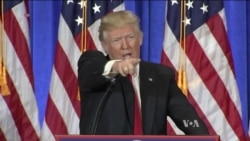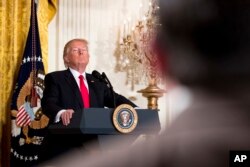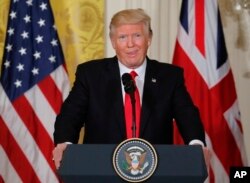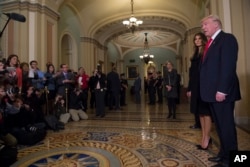U.S. President Donald Trump seems to relish an occasional fight, and that was evident during his first solo news conference as president, which he dedicated almost entirely to chastising the news media.
For nearly 80 minutes, Trump scolded individual reporters for being "unfair," dismissed specific media outlets as purveyors of "fake news" and generally attacked the American press as being "out of control."
Addressing reporters arrayed in front of him at the White House, Trump told them: "You're dishonest people." The crowded news conference was arranged on short notice, but it was broadcast live by every major U.S. television network.
The president anticipated he might be criticized in headlines around the country. "But I'm not ranting and raving," he said with a smile. "I love this. I'm having a good time doing it."
Trump vs media: love/hate
Thursday's angry outburst may have been unusual compared with the public behavior of past U.S. presidents, but for Trump, it was a continuation of his lifelong love/hate relationship with the news media.
The billionaire real estate developer and former reality television star has for decades benefited from, and even bragged about, his ability to cultivate media attention. But more recently, since he entered politics and won the presidency, Trump's relationship with the media has turned sour.
Since announcing his candidacy in 2015, Trump has been the target of a barrage of negative news stories. Since entering the White House, the bull's-eye on his back has only gotten larger.
In response, Trump has called reporters members of an "opposition party," in contrast to the image most White House journalists have of themselves — nonpartisan observers who chronicle the activities of the nation's chief executive — and he often seems to view the press as his political rivals.
Just as he referred to his political opponents last year, Trump has adopted a nickname for the reporters who cover his every move — the "dishonest media" — and he regularly dismisses news coverage he does not like as "fake news."
Obsessed by news, even if 'fake'
But as much as Trump quarrels with the media, he can't stop obsessing over it. The president is said to spend most of his mornings and evenings watching cable news, often responding to what he sees and hears in real time, on Twitter. The interaction has left longtime political observers stunned.
"I've covered politics off and on in Washington since 1964, and I have never seen a public figure this obsessed with media coverage," said veteran journalist Steven Roberts, a longtime correspondent for The New York Times and other news outlets who now teaches media and public affairs at George Washington University.
Trump says he's just "counterpunching" — going after the media only when it attacks him first. But it would be a mistake to view the exchange in that way, says Gwenda Blair, a Trump family biographer who has been following Trump for decades.
"It's easy to forget that he loves combat. He loves confrontation. He loves this aggressive, charged, conflict-filled environment," Blair said in an interview with VOA. "That's normal. That's his comfort zone."
Sensational = a good story
Trump has explicitly suggested that he sometimes engages in provocative behavior simply to attract media attention.
In his 1987 book The Art of the Deal, Trump said: "One thing I've learned about the press is that they're always hungry for a good story, and the more sensational the better. ... The point is that if you are a little different, a little outrageous, or if you do things that are bold or controversial, the press is going to write about you."
Blair chalks up that kind of behavior to Trump's natural ability as an entertainer.
"The number-one rule as a performer is to do something unexpected, so people won't look away," she said. "And he's aces at that. He's constantly doing something unexpected, contradicting himself, lashing out at somebody."
It's exactly the kind of behavior that plays perfectly into the media's need to have fresh news all the time, Blair pointed out.
Approval ratings suffer
So far, that strategy has worked well for Trump. He is, after all, the most powerful leader in the world. But it's not clear the plan will work as well for him in the White House as it has in the real estate business or the world of entertainment.
Since taking office, Trump's approval rating has suffered. Generally trusted public-opinion surveys show his popularity ratings are much lower than those his predecessors enjoyed at this early stage of their presidencies.
However, there also is reason to think Trump's efforts to undermine the news media may be working. A recent poll by Emerson College found Americans trust the Trump administration more than they do the news media.
Trump's team has repeatedly pointed to the poll as evidence he is winning his battle with the media, suggesting he won't change tactics anytime soon.
Michael D'Antonio, another Trump biographer, agrees, saying anyone who expects Trump to change at this point will be disappointed.
"He's 70 years old. He believes that his impulses and perspective are the source of his success," D'Antonio said. "So there's not a real sense in his mind that he should change."

































